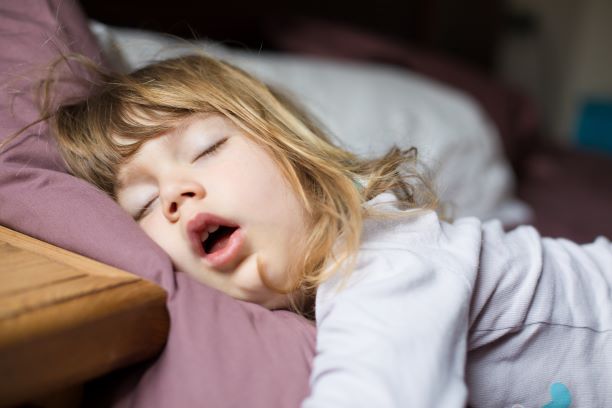If you find your child mouth breathing most of the time while sleeping or when sitting quietly, they have been oxygen deprived.
Humans are typically the only “animals” that routinely breathe through the mouth instead of the nose. Watch your pets or animals; unless they just finished a bolt of running, they breathe through the nose, quietly and peacefully.
Sleep has different “stages” that we cascade through during a normal night’s sleep. The 1st three stages are part of “Non-Rem” sleep and progress from initial drowsiness to deeper, restful sleep. REM (or dream-state) sleep is also important for neurocognitive restoration. Our brains and body require that all stages of sleep be attained for optimal health.
Mouth breathing can interfere with these important parts of sleep and may prevent REM sleep from occurring. In adults, you might recall when you wake after having a few adult beverages….you “sleep” but you don’t feel “rested”. That’s because alcohol interferes with some REM sleep stages. Your brain doesn’t get the restoration it requires nor does the rest of your body.
Mouth breathing has a similar effect, especially in kids. It can interfere with REM sleep. Do you dread trying to wake your kids for school? Maybe they aren’t getting all of the stages of sleep necessary during sleep. Is their mouth open when you walk into the bedroom?
If they consistently mouth breathe at night that’s a problem. Proper nasal breathing is critical for growing children, and adults. During early childhood, an inability to nasal breathe can manifest with problems breastfeeding, or bottle feeding, latching, etc. Facial development will be altered in a negative way. The jaws will have unequal growth that can lead to TMJ problems, sleep issues, and brain development.
A longitudinal study (Avon Longitudinal Study of Parents and Children) looked at the effects of consistent mouth breathing of 11,000 children under the age of 7 and found a significant connection between SDB (Sleep Disordered Breathing) and ADHD, aggression tendency, anxiety, and other behavioral manifestations.
Most significantly and concerning was the finding that SDB symptoms that are present before age 5 were associated with a 40% greater chance of special education needs by age 8.
**The ability to properly breathe in early childhood sets the course of some neurocognitive abilities, facial growth tendencies and strong pre-dispositions for future TMJ problems. **
In my experience, most physicians aren’t aware of the critical importance of aggressive airway management before age 10 and often shrug off snoring, bedwetting, frequent respiratory illnesses, enlarged tonsils, et. al. that we see most every week in children and teens with TMJ problems manifesting as pain and problems opening the mouth.
A list (downloadable PDF) of common signs and symptoms and visuals that parents can look for that will suggest your child or teen has an airway problem are located on our website under the Sleep Breathing Disorders tab.
Get a TMJ/Sleep trained Dentist to help educate your pediatrician or doctor about early intervention. We are here to help you navigate the details.
Look for more on this topic to come…




